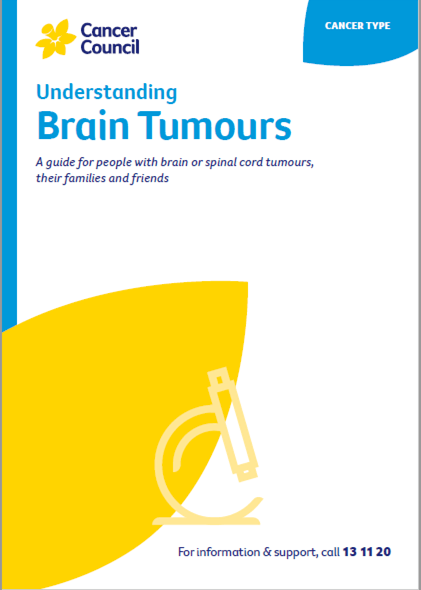- Home
- Brain tumours
- Treatment
- Surgery
Surgery for brain cancer
Surgery in the brain or spinal cord is called neurosurgery.
For general information about what surgery is and how it is used to treat cancer, see Surgery.
Learn more about:
- Why have surgery?
- When surgery is not possible
- What to expect before surgery
- Types of surgery for brain cancer
- What to expect after surgery
- Side effects of surgery
- Video: Surgery for brain cancer
Why have surgery?
You may have surgery to:
- remove the whole tumour (total resection)
- remove part of the tumour (partial resection or debulking)
- help diagnose a brain tumour (biopsy).
Removing part of the tumour may be considered when the tumour covers a wider area or is near major blood vessels or other important parts of the brain or spinal cord. This may help reduce the pressure on your brain, which will improve some of the symptoms.
When surgery is not possible
Sometimes a tumour cannot be safely removed because it is too close to certain parts of the brain and surgery would cause blindness, speech problems or partial paralysis. This is called an inoperable or unresectable tumour.
Your doctor will talk to you about what other treatments you can have and ways to manage symptoms.
What to expect before surgery
The different scans used to diagnose a brain tumour (such as MRI or CT scans) are often done again to help plan surgery.
To help the surgeon avoid damaging the most important areas of the brain, you may have a type of MRI scan called a functional MRI (fMRI). You will be asked to complete brain exercises during the scan to show the exact areas of the brain that are used as you speak or move. These parts of the brain can also be found during surgery with brain mapping.
Tell your doctor about any blood-thinning or other medicines you are taking. Some medicines interfere with the anaesthetic used during the operation, so you may need to stop taking them for a while.
If you smoke, it is important to stop before surgery. Continuing to smoke can increase the risk of complications.
Having surgery to the brain can sound frightening and it is natural to feel anxious beforehand. Talk to your treatment team about your concerns, call Cancer Council 13 11 20 for support, or listen to our podcast on Managing Fear.
→ READ MORE: The types of surgery for brain cancer
Video: Surgery for brain cancer
Find out more about the surgery options for brain cancer, including craniotomy, awake craniotomy, and endoscopic surgery.
Podcast: Making Treatment Decisions
Listen to more of our podcast for people affected by cancer
More resources
A/Prof Lindy Jeffree, Neurosurgeon, Royal Brisbane and Women’s Hospital, QLD; Emma Daly, Neuro-oncology Clinical Nurse Consultant, Cabrini Health, VIC; A/Prof Andrew Davidson, Neurosurgeon, Victorian Gamma Knife Service, Peter MacCallum Cancer Centre and Department of Neurosurgery, Royal Melbourne Hospital, VIC; Beth Doggett, Consumer; Kate Fernandez, 13 11 20 Consultant, Cancer Council SA; Melissa Harrison, Allied Health Manager and Senior Neurological Physiotherapist, Advance Rehab Centre, NSW; A/Prof Rosemary Harrup, Director, Cancer and Blood Services, Royal Hobart Hospital, TAS; A/Prof Eng-Siew Koh, Radiation Oncologist, Liverpool Cancer Therapy Centre, Liverpool Hospital and University of New South Wales, NSW; Andy Stokes, Consumer.
View the Cancer Council NSW editorial policy.
View all publications or call 13 11 20 for free printed copies.



